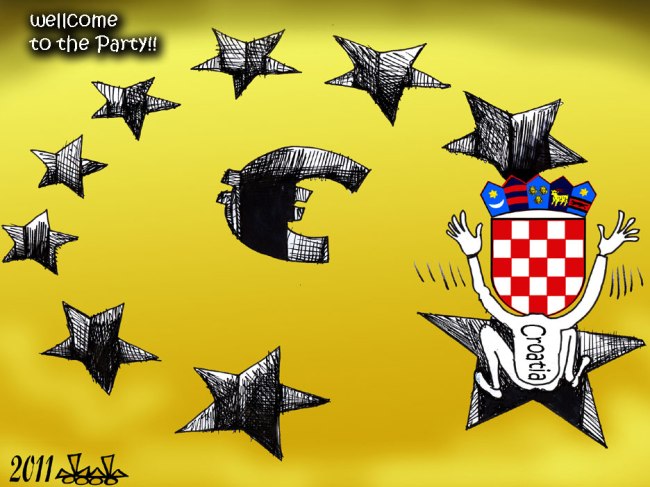Picture: Born in 1963, Lebanese-Iraqi cartoonist Hassan Bleibel publishes in several Middle-Eastern newspapers including Lebanon’s Al-Mustaqbal and As-Safir, and Egypt’s Al-Ahram. His work has also featured in the western press – in Le Monde and Courrier International in France, and also in the International Herald Tribune.
The below write up is taken from the 2012 U.S. State Department Report on Human Rights. Issued: April, 2013.
Section 2. Respect for Civil Liberties, Including:
a. Freedom of Speech and Press
The constitution and law generally provide for freedom of speech and the press; however, growing economic pressures led journalists to practice self-censorship. Specifically, a number of journalists reported that publishers and media owners feared they would lose advertisers and frequently practiced self-censorship in reporting on advertisers or those linked politically to them. Direct government efforts to influence the media were occasionally reported at the local level.
Freedom of Speech: The law provides for no less than six months’ and no more than five years’ imprisonment for hate speech. Hate speech committed over the Internet is punishable by six months’ to three years’ imprisonment. While freedom of speech is guaranteed by the constitution, the criminal code sanctions individuals who act “with the goal of spreading racial, religious, sex, national, ethnic hatred or hatred based on the color of skin or sexual orientation or other characteristics.”
On November 6, the Supreme Court ruled that Vlatko Markovic, former president of the country’s football federation, must publicly apologize for calling homosexuals “unhealthy” and for proclaiming that he would never allow a homosexual player in his league. Markovic subsequently apologized. A court in Zagreb rejected the case in 2011, but LGBT activists appealed to the Supreme Court.
Freedom of Press: Many private newspapers and magazines were published without government interference. However, according to a May declaration from the Croatian Journalists Association (CJA), media ownership was not fully transparent; some business and political interests concealed their influence on media outlets. CJA President Zdenko Duka said in a September 16[, 2012] interview that the country’s National Security Council had done little to reveal the identity of media owners.
The law regulates the national television and radio networks separately from other electronic media. Independent television and radio stations operated in the country, and two of the four national television channels were privately owned and independent. There were no reports of the government influencing these outlets via advertising revenue. Local governments partly or fully owned approximately 70 percent of the local broadcast media, making them particularly vulnerable to political pressure. Approximately 46 percent of local radio stations depended on local authorities for financial support.
Minister of Internal Affairs Ranko Ostojic announced on December 21[,2012} that an internal police investigation uncovered police misconduct in the 2011 surveillance of journalists, including the editor in chief of national daily newspaper Jutarnji list. According to Ostojic’s statement, the country’s former police chief ordered the operation to determine the source of leaked information from corruption investigations against former prime minister Ivo Sanader. Ostojic turned over the results of the investigation to the Prosecutor’s Office. On December 13, the CJA called for an investigation into the case stating, “If Croatia is to be a democratic country, then its leaders must not allow journalists to be followed and tapped in the course of their professional activities. It is necessary to step up civil control of the police and secret services.”
Libel Laws/National Security: Libel is a criminal offense. During the year there were no reports of politically motivated libel cases being filed. A large number of earlier libel cases remained unresolved due to judicial backlogs. Courts may fine, but not imprison, persons convicted of slander and libel.
Internet Freedom
There were no government restrictions on access to the Internet or credible reports the government monitored e-mail or Internet chat rooms without judicial oversight. According to December 2011 statistics from Internet World Stats, there were 2,656,089 Internet users, representing 59.2 percent of the population.
Academic Freedom and Cultural Events
There were no government restrictions on academic freedom or cultural events.
Related articles
- Something is Rotten in the State of Croatia (compassionwithsizzle.wordpress.com)
- Overwhelming Media Censorship in Croatia, Croatia to Join European Union in July, 2013 (compassionwithsizzle.wordpress.com)
- Who is Domagoj Margetic? Celebrating Independent Journalism in Croatia. (compassionwithsizzle.wordpress.com)
- Croatia a Banana State: in Which the Most Underaknowledged Asset is the Truth. Domagoj Margetic, Strikes with Hunger Day 22. (compassionwithsizzle.wordpress.com)
- The 1st Amendment (writingformassmediasp13.wordpress.com)
- C3: Americans don’t fully appreciate (or protect) freedom of the press (stevebuttry.wordpress.com)
- We Are Not Going To Kill You, But We Will Not Let You Live, Either (compassionwithsizzle.wordpress.com)
